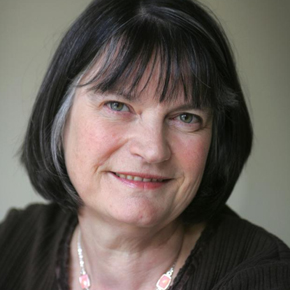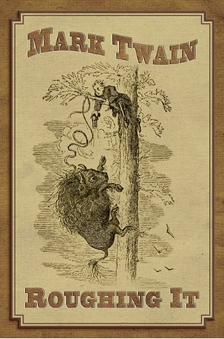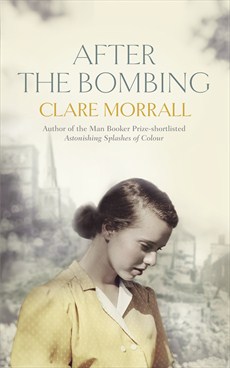Tickled pink, black and blue
by Clare MorallWhen Howard Jacobson won the Man Booker Prize in 2010 with The Finkler Question, there was much debate and discussion about humour in novels and how this was the first time a comic book had won the prize. What nonsense! In my experience, all the best books contain humour. This is, of course, an exaggeration, since I am usually won over by sharp, clever prose, beautiful images, profound thoughts and gripping plots, but humour can take a book to another level.
A novelist is attempting, amongst other things, to reach the emotional centre of the reader, and if you laugh you’re more receptive to other emotions – shock, terror, sadness. Black humour serves a valuable purpose. It’s a way of processing, breaking down difficult emotions into manageable slices, coping. Too much tragedy is indigestible. Laugh at it and you won’t crumble.
I’ve selected ten books that have made me laugh and still do. It concerns me that most of these books are by men, and I don’t know if this means that I like male humour, or simply that I haven’t yet come across enough of the right books by women. I like Jewish humour too. Jacobson’s Finkler longs to be a Jew, yearning for the history, the suffering. I’m afraid I am envious for a more mundane reason – the jokes are rather good. But these are books I’ve loved, books that have lifted themselves out of the ordinary into something special because of their humour.
I read this many years ago on a train, and giggled quietly as I crossed the country to a long-forgotten destination. It’s an account of Twain’s journeys through the barely tamed wild west: rambling, lyrical, witty. He is bitingly funny as he takes on the role of the innocent bystander, refusing to show reverence for anything. He goes silver mining, but spends so long calculating his profits that he forgets to register his claim and loses it; he goes to Salt Lake City and hilariously analyses the Book of Mormon; meets Vigilantes (with a capital V), unwillingly accepting coffee from Slade the Terrible who has has twenty-six murders to his credit, convinced that he is going to be number twenty-seven; he discusses the height of sagebrush, but digresses into an anecdote about a Syrian camel who ate his coat and his documents, but keeled over and died once it encountered statements that even a camel couldn’t stomach. He comes perilously close to too many jokes, but it’s impossible to hold it against him.
2. The House at Pooh Corner by A.A. Milne
No collection of funny books would be complete without Winnie-the-Pooh. There is something irrationally pleasing about dialogue that has no real purpose, that doesn’t exactly move the action along, but manages to fill a space exactly. Nobody takes much notice of anything that anyone else says, but they all say it anyway. I have a particular fondness for Eeyore, who has pessimism down to a fine art. In the chapter where Pooh and Piglet are playing Poohsticks, he comes floating out from under the bridge on his back with his legs sticking up in the air. Piglet is extremely excited to see him, but Eeyore refuses to point out that he needs help. He prefers to be a martyr, floating around three times in a little eddy, not even prepared to admit to being Eeyore. I have met people like this. They suffer in silence, except somehow they don’t. All human nature is here, encapsulated in the conversation of a few talking animals who do very little with their lives. And it goes on being funny, however many times you read it.
3. Cold Comfort Farm by Stella Gibbons
This book was first published in 1932. I read it for the first time about twenty years ago, and was surprised to find that it was still funny. It’s a parody of a certain type of nineteenth-century novel D.H. Lawrence, Thomas Hardy, the Brontes – with a romanticised rural setting. When her parents die, Flora Poste, who has all the skills required of a modern young woman except the ability to earn a living, imposes herself on distant relatives. She’s a practical young woman and proceeds to organise everyone in an attempt to improve the farm, cheerfully prepared to take on the surly and uncommunicative Seth, whose mind never strays far from sex, an escaped bull, and apparently authentic – but actually invented – dialect. Her aunt, Ada Doom, mutters constantly about seeing something ‘nasty in the woodshed’ when she was a girl, but we never find out about what it was.
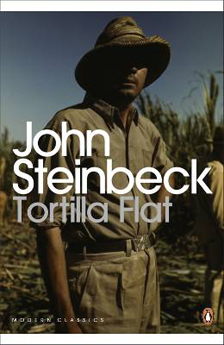 4. Tortilla Flat by John Steinbeck
4. Tortilla Flat by John Steinbeck
I’ve read all of Steinbeck’s novels, several of them more than once. I initially fell for the lyrical style of The Grapes of Wrath and Of Mice and Men, but then moved on to Tortilla Flat and discovered a bunch of amoral characters who do nothing but drink and lie around and live off the proceeds of petty crime. What is there to like about them? Nothing at all if you want to be guided by any moral sense. And yet – how can you resist their humour, the simplicity of their approach to life, their ability to survive against the odds? When three of them burn a house down by mistake, Danny, who owns the house, goes back to bed, not really interested. Since the fire department can’t put the fire out, he reasons, how can anyone expect him to do anything? Then there is the episode of the vacuum cleaner given to a woman in exchange for favours. She has no electricity, but happily pushes it backwards and forwards until it gets sold to a man who does have electricity. He discovers that it has no motor. It’s all nonsense, but, in a way that’s hard to put your finger on, authentic.
5. A Perfect Spy by John le Carré
This is the quintessential spy novel, up to its neck in double agents, betrayal, hidden agendas and a complex relationship between a father and son. Magnus’s charismatic father provides a life of luxury, but mysteriously disappears every now and again before turning up once more with his court, the ever loyal Sid Lemon and the lovelies, hangers-on who come and go with the money. There’s a gloriously funny chapter when he decides to run in a by-election. We’re told that whatever else we do in life, between birth, marriage, divorce and death, we should stand as a Liberal candidate in a remote area of East Anglia. Magnus tells us how to stand on doorsteps, charm votes out of old ladies and see them right if it kills us. The words pour out, magic and magnetic, witty and clever, and we are beguiled, wrenched through every emotion. Everything le Carré writes, like all great literature, walks a tightrope between tragedy and humour; terrifying, exhilarating, brilliant. He knows how to move us without resorting to sentimentality, keeping us hovering, halfway across, unable to decide whether we should weep or howl with laughter.
6. Behind the Scenes at the Museum by Kate Atkinson
This is a frenetic book, covering more than one generation, from the time of Ruby Lennox’s great-grandmother to the present day. It’s crammed with period detail, disastrous relationships, parents who don’t know the first thing about parenting, catastrophes, all of which are accompanied by hilarious details that are disturbingly familiar to the reader. I particularly like the chapter about a summer holiday. Ruby’s family, following another car to Scotland, are continually on the verge of panic, terrified that they will lose sight of the car in front of them and never reach their destination. Ruby’s mother Bunty is having an affair with Roger, the father of the other family. Ruby contemplates the irony of stopping for lunch in a hotel – an unusually posh thing to do – knowing that Bunty will consider it romantic to be there with her lover, even though they are accompanied by two spouses and five children. The journey is punctuated by sudden halts when Roger’s wife dashes out of the car and holds the ‘baby-David teapot’ over the grass verge. The occupants of the car behind watch as ‘a stream of liquid like weak tea emerges from his nether regions.’
7. Headlong by Michael Frayn
How can a book about art be funny? The clue is in the title. It’s about a man’s desperate pursuit of a work of art. We learn all about Brueghel and his work, as Martin, a would-be art historian, plunges into a series of manic plots to get his hands on a lost masterpiece. He sacrifices everything, even spends his wife’s inheritance in his pursuit of this picture, justifying himself with dreams of fame and vast riches. It’s a portrait of a man possessed, a man who cannot moderate his behaviour as he becomes increasingly desperate. I learned a great deal about Brueghel in this book, while romping through it with nearly as much dedication as Martin, charmed and appalled by his behaviour, laughing all the way.
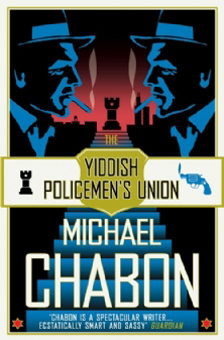 8. The Yiddish Policeman’s Union by Michael Chabon
8. The Yiddish Policeman’s Union by Michael Chabon
A novel with this title would have to make you laugh somewhere along the way. It depicts an alternative future: after the Second World War, the Jews were not allowed to settle in Palestine. They were given a part of Alaska for a limited period and that period is almost up. Hence the recurring greeting of so many of the characters: “These are strange times to be a Jew.” At the end of chapter two, the policeman, Meyer Landsman, the hard-drinking, tortured protagonist who won’t let go of a murder, reflects that “even the most casual study of the record would show that strange times to be a Jew have almost always been, as well, strange times to be a chicken.” It would be hard to outdo a line like that. There’s a mysterious murder in a seedy hotel room, a game of unfinished chess, a bitter winter. Landsman is everything you expect from a detective – cynical, bitter, divorced, with a dead sister – but every page sparkles with cleverness and wit.
9. Angelmaker by Nick Harkaway
This is one of those big, rolling books that stretch the imagination and belief way beyond their normal parameters. It features Joe Spork, an amiable young clockmaker who has trouble with relationships, and is dragged unwillingly into a rip-roaring adventure featuring a doomsday machine which has something to do with mechanical bees, an ex-woman spy who is nearly ninety and longs for action, and an indestructible arch villain. His dead father went to prison, so Joe has access to the criminal world, with loyal sidekicks and night markets under the Thames, despite his determination to remain honest. The action is non-stop. There are mad monks, mass deaths, assassins hiding in the shadows, but the ever-present humour keeps everything grounded. Nick Harkaway, (who turns out, unsurprisingly, to be John le Carré’s son) has taken every ingredient you can think of, mixed them up and produced an outrageously funny and hyperactive thriller.
10. Norwegian by Night by Derek B. Miller
I have only recently completed this, having read it for my book group. I hope they’ve enjoyed it as much as I did – we do not always agree. This is the story of Sheldon Horowitz, an eighty-year-old Jewish American ex-marine living in Oslo, who cannot escape the history of his people or the tragedy of his own life. His son died in Vietnam and he blames himself for influencing him. After witnessing a murder, he goes on the run in Norway with a silent, traumatised boy, in order to protect him from a murderous Kosovan gang. The book is exciting, but also profound and moving. Sheldon’s observations on life are frequently hilarious. When he discovers he has a granddaughter that he didn’t know about, he says: “Well. We killed the first one but God’s giving us a second chance to get it right. I wonder if we get a prize if this one makes it to adulthood.” He tells the truth, but not like anyone else. His words and observations are unique. And very funny.
Clare Morrall was born in Exeter and now lives in Birmingham where she works as a music teacher. Her first novel, Astonishing Splashes of Colour (2003) was shortlisted for the Man Booker Prize. She has since published five novels: Natural Flights of the Human Mind, The Language of Others, The Man Who Disappeared, The Roundabout Man and now After the Bombing, a moving exploration of the lasting impact of the Second World War published by Hodder & Stoughton in hardback and eBook.

